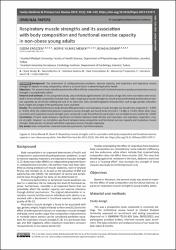| dc.contributor.author | Ergezen, Gizem | |
| dc.contributor.author | Yılmaz Menek, Merve | |
| dc.contributor.author | Demir, Rengin | |
| dc.date.accessioned | 2023-08-10T11:24:58Z | |
| dc.date.available | 2023-08-10T11:24:58Z | |
| dc.date.issued | 2023 | en_US |
| dc.identifier.citation | Ergezen, G., Yılmaz Menek, M. ve Demir, R. (2023). Respiratory muscle strengths and its association with body composition and functional exercise capacity in non-obese young adults. Family Medicine and Primary Care Review, 25(2), 146-149. https://dx.doi.org/10.5114/fmpcr.2023.127671 | en_US |
| dc.identifier.issn | 1734-3402 | |
| dc.identifier.issn | 2449-8580 | |
| dc.identifier.uri | https://dx.doi.org/10.5114/fmpcr.2023.127671 | |
| dc.identifier.uri | https://hdl.handle.net/20.500.12511/11301 | |
| dc.description.abstract | Background. The assessment of cardiopulmonary problems, exercise capacity, and inspiratory and expiratory muscle strength all depend on body composition, which is a crucial factor in determining human health. Objectives. The present study aimed to examine the effect of body composition and functional exercise capacity on respiratory muscle strength in young healthy adults. Material and methods. In the prospective study, sixty individuals aged between 18-25 years of age who were non-obese were evaluated in terms of body composition by body mass index, respiratory muscle strength by mouth pressure threshold and functional exercise capacities by six minute walking test and sit to stand test. Also, sociodemographic characteristics such as age, gender, education level, height and weight of the participants were recorded. Results. The relationship between body density (BD) parameters and inspiratory muscle strength was found to be moderate (r = 0.394, p < 0.05), while the relationship between expiratory muscle strength was found to be minimal (r = 0.282, p < 0.05). When other measurements and respiratory muscle strength were compared, it was found that the parameters are unrelated to one another (p > 0.05). Conclusions. Present study showed a significant correlation between body density and inspiratory and expiratory respiratory muscle strength. However, no correlation was found between body composition and functional exercise capacity and respiratory muscle strength. Body density increment will affect respiratory muscle strength negatively. | en_US |
| dc.language.iso | eng | en_US |
| dc.publisher | Termedia Publishing House Ltd. | en_US |
| dc.rights | info:eu-repo/semantics/openAccess | en_US |
| dc.rights | Attribution-NonCommercial-ShareAlike 4.0 International | * |
| dc.rights.uri | https://creativecommons.org/licenses/by-nc-sa/4.0/ | * |
| dc.subject | Body Composition | en_US |
| dc.subject | Maximal Respiratory Pressures | en_US |
| dc.subject | Functional Capacity | en_US |
| dc.title | Respiratory muscle strengths and its association with body composition and functional exercise capacity in non-obese young adults | en_US |
| dc.type | article | en_US |
| dc.relation.ispartof | Family Medicine and Primary Care Review | en_US |
| dc.department | İstanbul Medipol Üniversitesi, Sağlık Bilimleri Fakültesi, Fizyoterapi ve Rehabilitasyon Bölümü | en_US |
| dc.authorid | 0000-0002-2851-9774 | en_US |
| dc.authorid | 0000-0001-6993-7983 | en_US |
| dc.identifier.volume | 25 | en_US |
| dc.identifier.issue | 2 | en_US |
| dc.identifier.startpage | 146 | en_US |
| dc.identifier.endpage | 149 | en_US |
| dc.relation.publicationcategory | Makale - Uluslararası Hakemli Dergi - Kurum Öğretim Elemanı | en_US |
| dc.identifier.doi | 10.5114/fmpcr.2023.127671 | en_US |
| dc.institutionauthor | Ergezen, Gizem | |
| dc.institutionauthor | Yılmaz Menek, Merve | |
| dc.identifier.wos | 001030824600006 | en_US |
| dc.identifier.scopus | 2-s2.0-85171390940 | en_US |
| dc.identifier.scopusquality | Q4 | en_US |



















